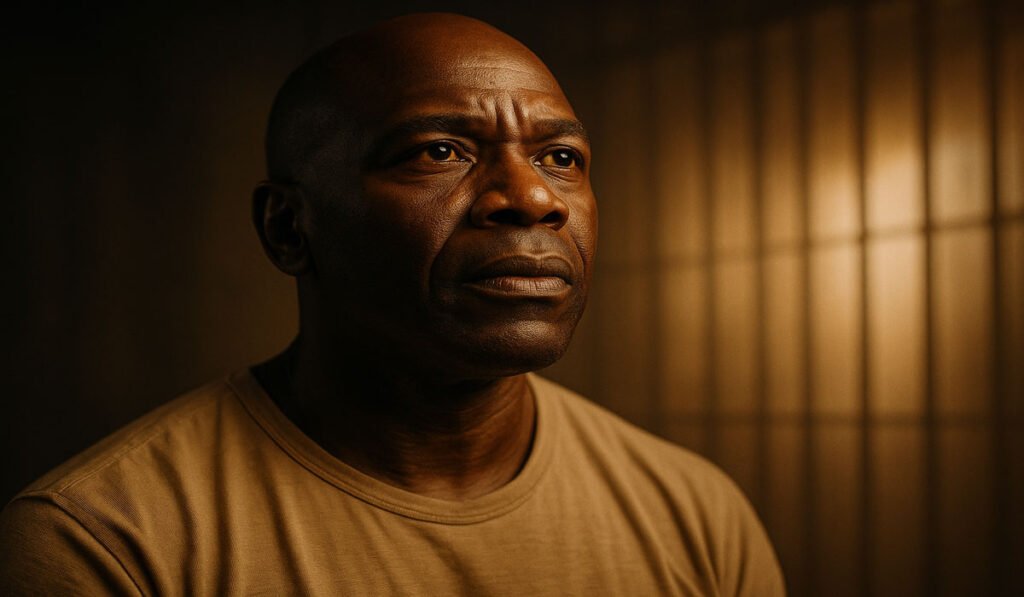Table of Contents
ToggleA Life Stolen: The Wrongful Conviction of Lamar Johnson
Imagine being told you’ll spend the rest of your life in prison for a crime you didn’t commit. For Lamar Johnson, this wasn’t a hypothetical. In 1995, his life was stolen by a wrongful murder conviction, sparking a nearly three-decade fight for freedom from a justice system that seemed determined to keep him silenced.
For 28 years, from behind the cold steel of prison bars, Johnson’s voice never wavered. He was innocent. His story is a harrowing journey of injustice, but it is also a powerful testament to one man’s unbreakable spirit in the face of overwhelming odds.
A Case Built on Sand: The Flawed Investigation
The entire case against Lamar Johnson was a house of cards, built on a foundation of shaky evidence and questionable police work. The tragedy began in October 1994, when Markus Boyd was killed on his front porch by two masked men. The investigation that followed was a textbook example of tunnel vision.
Johnson had a verifiable alibi—he was miles away with his girlfriend and their baby daughter. But facts didn’t seem to matter. Investigators zeroed in on him, brushing aside the alibi and a timeline that made his involvement a physical impossibility.
The Path to a Life Sentence: A Trial of Deception
Johnson’s 1995 trial was not a search for truth, but a performance of injustice. The prosecution’s star witness, Greg Elking, was the only person to supposedly identify Johnson. Years later, Elking would confess that he was pressured by police and couldn’t actually see the shooters’ faces.
To make the case seem stronger, prosecutors presented testimony from a jailhouse informant, a man with a long criminal record and known racial biases. Crucial information, like the fact that the eyewitness was paid thousands of dollars by law enforcement, was deliberately hidden from the jury. With the scales of justice tipped so heavily against him, Johnson was sentenced to life without parole.
Light in the Darkness: Hope and Resilience Behind Bars
For the next 28 years, Lamar Johnson existed in a world where time is measured in lost moments. He missed his daughter’s first steps, her birthdays, her graduation. He lost the chance to live, to work, to be free. Yet, in the face of this profound loss, he refused to be broken.
From his cell, Johnson became his own best advocate. He filed endless appeals, studied law, and wrote countless letters, never once straying from his claim of innocence. This unwavering belief became the fuel for his long, lonely battle.
A Chorus for Justice: A Community Rallies for Truth
Johnson’s voice was eventually joined by others. A small group of supporters, convinced of his innocence, began to champion his cause. Among them was an unlikely ally: Ginny Schrappen, an 80-year-old woman who became his pen pal and a constant source of encouragement for nearly the entire duration of his sentence.
The Midwest Innocence Project took up his case, methodically dismantling the prosecution’s original narrative. Their work uncovered a trove of hidden evidence and exposed the depth of the misconduct that had put an innocent man in a cage.
The Truth Unleashed: A Historic Hearing
In December 2022, the truth was finally given a platform. During a week-long hearing, the flimsy case against Johnson disintegrated. The key eyewitness tearfully recanted his testimony. In a stunning turn, the man who actually committed the murder, James “B.A.” Howard, confessed from the witness stand.
The evidence of Johnson’s innocence was no longer just a claim; it was a clear, convincing, and undeniable fact. The elaborate fiction that had cost him 28 years of his life had finally collapsed.
A Bittersweet Freedom: Life After Exoneration
On Valentine’s Day 2023, Judge David Mason officially declared Lamar Johnson an innocent man. After 10,199 days in prison, he walked free. The moment was a powerful victory for truth, but also a somber reflection on a justice system capable of such profound error.
Re-entering the world after nearly three decades is a daunting task. Johnson has been reconnecting with his family and finally met his faithful pen pal, Ginny, in a deeply emotional reunion. He is embracing his freedom, but the deep scars of the years stolen from him remain.
Demanding Accountability: The Fight Isn’t Over
Freedom is not the same as justice. In January 2024, Johnson took the next step in his journey by filing a federal lawsuit against the city of St. Louis and the police officers responsible for his wrongful conviction. He is seeking accountability for the actions that robbed him of his life.
This fight is about more than money. It’s about sending a message that such flagrant misconduct cannot be tolerated. It’s a fight to ensure that the system that failed him is forced to change, so that no one else has to endure what he did.
The Enduring Legacy of Lamar Johnson
Lamar Johnson’s story has resonated across the nation, forcing a difficult conversation about wrongful convictions and police accountability. His case has already spurred legislative change in Missouri, creating a new pathway for innocent people to prove their claims.
His journey is a stark reminder that the fight for justice is often a marathon, not a sprint. It shows that one person, armed with the truth and an unbreakable will, can indeed challenge a flawed system and, against all odds, win. Lamar Johnson’s legacy is not just one of survival, but of profound and lasting hope.













